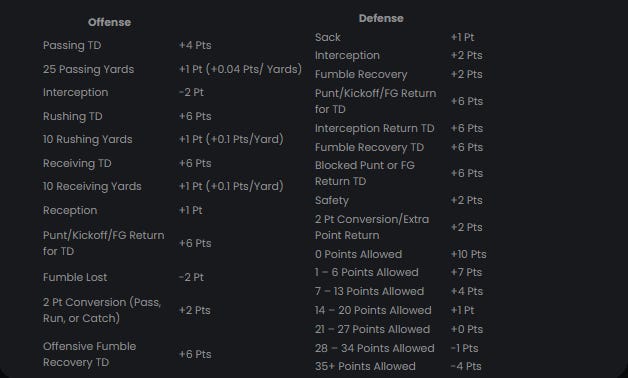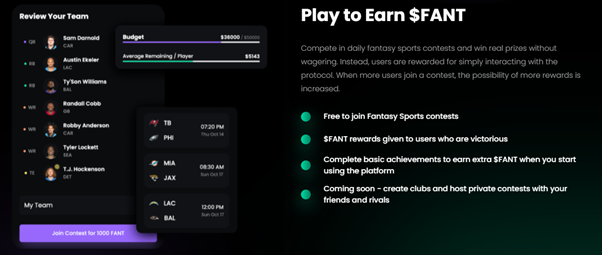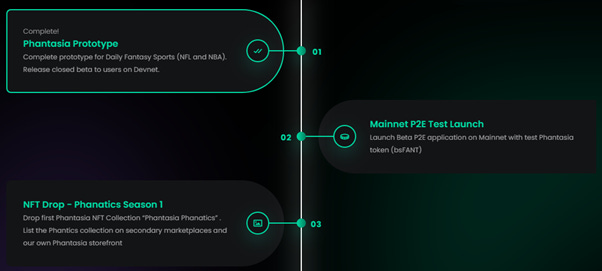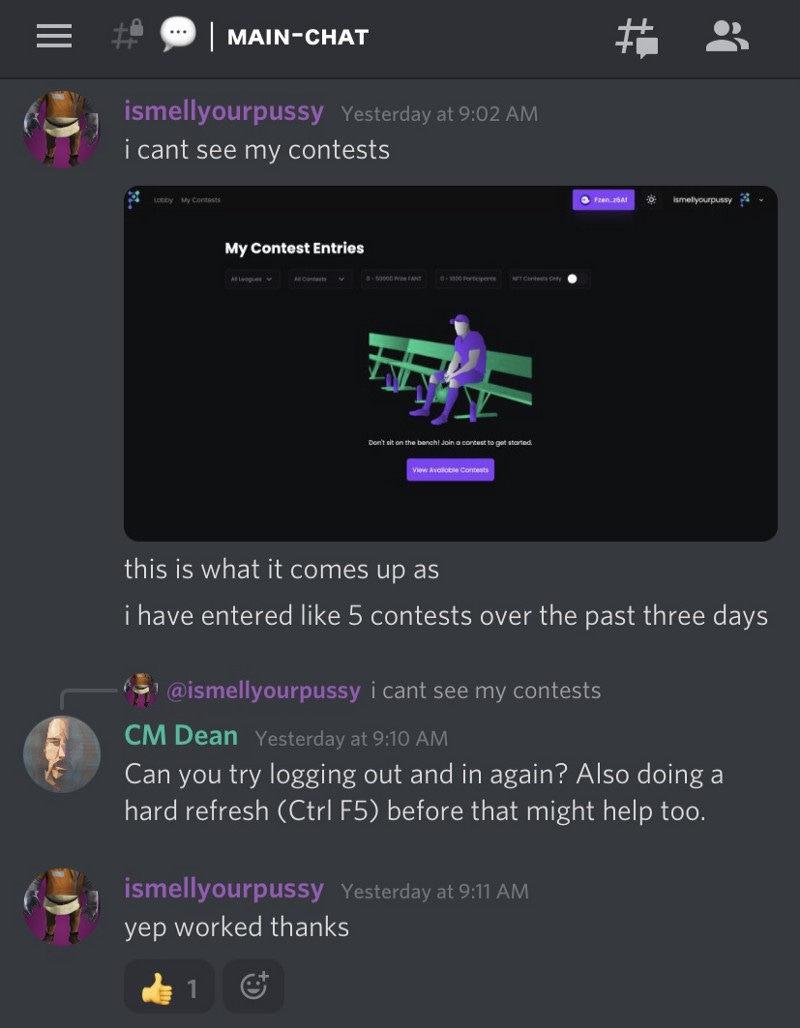Deep Dive: Down the Phantasia Rabbit Hole
An exploration of what Phantasia, a Solana-based fantasy sports platform, has to offer.
I spent most of last week taking a plunge into the world of blockchain-based fantasy sports platforms, and it’s a rabbit hole I may never come out of.
This document captures my experience with Phantasia’s closed beta, a decentralised fantasy sports platform that is building on the Solana blockchain. It explores the concepts and ideas behind the platform, unpacks the project’s roadmap, delves into its community, and captures the market outlook and competitive landscape.
The idea is to provide a holistic overview of the project for anyone who may be interested in fantasy sports platforms on the blockchain. So with that out of the way, let’s jump in!
What is Phantasia
The Phantasia website describes it as a “first of its kind Fantasy Sports Platform that leverages blockchain technology to bring the benefits of blockchain to Fantasy Sports Players”. I see the platform as a combination of three unique elements packaged into one intriguing offering. These three elements are:
The following paragraphs explore each of these elements in detail and explain how they tie in together to create the unique offering that is Phantasia.
a) Fantasy Sports League with in-game betting
Fantasy Sports, in general, refer to online games where players have to select a squad of real-life athletes and are rewarded for the on-field performance of these athletes. The concept of fantasy sports is believed to have originated from American sports, the National Football League (NFL) in particular. It has grown massively since and fantasy sports platforms can be found for several sports, most notably football (the EPL), cricket and the NBA.
There are different versions and iterations of fantasy sports. The Fantasy Premier League, which is the English Premier League’s official fantasy league, is a season-long fantasy contest. Players have a set budget to fill out a squad of 15 players and can make one transfer every week.
Daily Fantasy Leagues, which are popular for the NFL and NBA, require players to select a fresh line-up of players every day or every week using a set budget. DraftKings is one of the market leaders when it comes to daily fantasy sports.
In both season-long leagues and daily fantasy sports, players are awarded points if their selected athletes make positive contributions in the real-life game. For example, most NBA fantasy leagues award points when an NBA athlete makes a field goal or registers an assist, rebound, steal or block. Phantasia’s scoring system for the NFL is captured below.
Players whose squads accumulate the most points are declared the winners. Rewards for winners vary from platform to platform. Platforms such as Dream11 reward players with the winning pot, which consists of entry fees paid by all participants in the league. Others, such as the FPL, have a fixed pre-announced pot that is awarded to the winner.
Phantasia, in its final form, will offer both daily fantasy and season-long leagues for several sports, including the EPL and cricket. The current beta supports daily fantasy sports for the NBA and NFL. There is support for both 50/50, where the top 50% of users who entered the content are rewarded, and winner takes all leagues.
Season-long leagues are expected to launch in 2022. The team hopes to tie up with DeFi protocols to offer users the option to earn yields on the wagers they have locked into season-long leagues.
You may be wondering what differentiates Phantasia from some of the other platforms mentioned above. To begin with, Phantasia allows users to play to earn (P2E). This means that users can participate in daily fantasy sports contests and win $FANT (the Phantasia token) rewards without wagering. $FANT can also be won by completing basic achievements in-game.
It also hopes to introduce the ability to bet on outcomes of fantasy contests between friends and family through private leagues and clubs. In an episode of the Cryptonary podcast, Dan (a member of the Phantasia team) talks about how the inspiration for the platform came from his use of different apps to play fantasy sports and place bets with friends. He felt that combining both would create a product with a lot of demand.
Cryptonary: Phantasia | Fantasy Sports powered by Solana on Apple Podcasts
The challenge with running a fantasy sports platform combined with in-game betting is creating trust amongst users that their money is in safe hands and won’t be diverted to other purposes. This is where the use of blockchain technology comes in (more on this later).
There will be different tiers or levels of Clubs, with each tier defined by the amount of FANT that the club owner has staked. Higher-level clubs will offer increased features, such as analytics, club chats, automation tools and VIP customer support. By linking access to these features with the amount of FANT staked, the protocol creates a consistent demand for the FANT token.
b) Blockchain — powered by Solana
Hosting a fantasy sports platform on the blockchain is quite an intuitive fit now that I think about it. The blockchain helps overcome a key challenge of centralised fantasy sports platforms, i.e. information asymmetry between the platform and users. While users have full control over their team selection, they have to place trust that advertised winning pools are accurate and other players on the platform are legitimate.
This is not always the case. Fantasy Sports Platforms have been known to inflate betting pools, create dummy accounts and manipulate reward pool amounts. This lack of transparency makes fantasy sports an ideal candidate for blockchain innovation. Data regarding participants, winners and winning pools can be stored on the blockchain in an immutable way. Any user can verify the credentials of others without revealing any personal or confidential information.
Moreover, fantasy sports platforms are digitally native. As Mason Nystrom of Messari Inc. notes “digitally native ecosystems will experience the most immediate synergies with crypto-networks”. Phantasia is the manifestation of this synergy between a digitally native ecosystem and crypto-networks.
Building on Solana brings numerous important benefits for a consumer-facing app such as Phantasia. On the Cryptonary episode, Dan shed some light on the reasons that drove the Phantasia team to select Solana:
Fast transactions are necessary when dealing with real-time data. Dan specifically spoke about how Solana is possibly the only blockchain they can use for rapid updates to stats and points without clogging up the entire network.
Low gas fees make wagers of around $10–20 practical for end-users. The team had earlier tried building on Ethereum but found that gas prices would virtually take average users out of the picture.
The team also hopes to tie up with Chainlink in the future to bring all this data on-chain and reduce the time delay between real-world events and in-game updates.
c) NFTs
Another point of difference between Phantasia and traditional fantasy sports platforms is the integration of NFTs. Phantasia will integrate NFTs into its ecosystem in a few ways.
First, it plans to launch a collection of generative art NFTs with in-game utility, known as Phanatics. The first drop, or Season 1, of Phanatics NFTs is coming soon! Holders of this first season will be minters of any future drops. Holding Phanatics will also unlock exclusive platform features.
Phantasia also features a “Fan Card”, which is your fully customisable in-game identity. The fan card will showcase NFTs that users have won in addition to other achievements and will be displayed in leader boards, chat rooms and competitions. Each fan card consists of different elements, like badges, skins and mascots. All the different elements will be minted as Phantasia NFTs.
In addition to the in-game integration of NFTs, Phantasia is tying up with other creators and collectives to host private leagues on its platform. It has already partnered with the Rox Collective and Rogue Sharks. The former is a stats-based generative art NFT while the latter features 5000 unique collectible NFTs featuring sharks. Holders of either NFT project can request beta access to Phantasia and participate in private leagues. These private leagues often have attractive rewards, such as NFTs, for winners.
Moving forward, Phantasia is looking to enter similar partnerships with other NFT projects. Dan said it specifically wants to tie-up with projects working in the sports space.
Now that we understand Phantasia’s different elements, let’s check out the Project’s roadmap.
Roadmap
The Phantasia team has articulated a clear and coherent vision of where they see the project going.
They’re currently at the first step of this roadmap, which is completing a prototype for Daily Fantasy Sports, for the NBA and NFL, in closed beta. This step is likely to be completed very soon, as per announcements on the Phantasia discord server.
The next step is to launch a beta of the play to earn functionality on the mainnet. The beta will be supported by a test Phantasia token (bsFANT). The shift to a mainnet beta will probably occur soon and will be followed by season 1 of the NFT collection “Phantasia Phanatics”. NFTs will be launched via the Fair Launch Protocol.
Once the NFTs have been listed on Phantasia storefront and other secondary marketplaces, the team will proceed to complete formalities for an Initial Dex Offering (IDO).
Given that Phantasia is consumer facing and involves considerable amounts of consumer money, ensuring security is high on the priority list for the team. Resultantly, the team has expressed its desire to undertake comprehensive and rigorous security audits before finalising its IDO. The IDO will lead to Phantasia and the $FANT token going live on the mainnet. This will initially be limited to Daily Fantasy P2E leagues with gradual support for season-long leagues.
The $FANT token brings with it important governance functionality (discussed later) which will also be enabled after the IDO and mainnet launch are complete. All the core elements of Phantasia will be active upon the completion of this step.
The focus of the team will shift to enhancing the Phantasia marketplace and deploying additional game-related features. The former involves the inclusion of additional game skins, collections and vanity items earned through in-game play. The additional game-related features include new sports, private clubs, and season-long leagues.
How to use the Phantasia Beta
This section contains a detailed but simple walkthrough of Phantasia’s onboarding process. It starts with getting a beta request and covers everything required to enter the public daily leagues currently hosted on Phantasia.
Step 1: Join the Phantasia discord server:
You may have to type a character or symbol to verify yourself before getting access to the different channels.
Step 2: Join the #request-beta channel
This is where the team is giving interested users free access to their beta. You have to explain in a message why you should get access to the beta. Talking about your past interest/experience with fantasy sports, crypto or NFTs should help get you in.
If you happen to hold either a ROX or Rogue Sharks NFT, then you can head over to the specific request-beta channels for each. They can be found in the Phantasia discord navigation window.
Step 3: Register on the Phantasia website
Once the team gives you beta access, you’ll be added to the beta-user channel. This channel usually has the latest updates on upcoming leagues. Check the pinned messages to get updated information on the onboarding process.
For now, you can simply use your discord username (without the # and 4 digits) to register on Phantasia.app.
Step 4: Connect your wallet
Upon logging into Phantasia with your registered credentials, you’ll be redirected to its Lobby.
Before playing, you’ll need to link a wallet to Phantasia so that any rewards and winnings can be duly credited to you. Phantasia currently supports Phantom, Slope and Sollet.
The process of linking your wallet is seamless. I used Phantom and just had to enter my password into the wallet’s Chrome extension.
Step 5: Enter a league and assemble your squad
As stated previously, the beta currently supports daily leagues for the NBA and NFL. ROX and Rogue Sharks also host their own private leagues, accessible only to their NFT holders.
Select the league you want to play and click “Enter Contest”. This will bring up a squad selection window where you can assemble your team within the provided budget.
Click “Finalize Roster” when you’re done and you’ll be asked to pick a team name, post which it’ll be entered into the league.
Step 6: Check the leaderboards
There are a few things that give me more pleasure than utilising my sports acumen to beat others in fantasy contests. So I headed over to the “My Contests” page as soon as the day’s last NBA game was over to see how I had done.
Much to my dismay, I finished 29th out of 66 participants. I blame this loss entirely on Seth Curry, who could conjure up no more than 4 points.
My disappointment aside, the Phantasia points page is really well laid out. It allows users to check the performance of their own team as well as everyone else’s. You can also download the leaderboard and points as a CSV if you want to subject the results to further data analysis.
That just about covers all there is to know about using the Phantasia beta. The next section explores Phantasia’s discord community.
The Phantasia Community
Phantasia is a growing community that brings together sports and crypto enthusiasts. It has around 5k followers on Twitter and more than 2000 people have joined the discord server.
The steps involved in getting access to the Phantasia discord have been covered above. Here, we’re going to talk about what you can expect to find once you’ve joined as a member.
You’ll notice that the server has been neatly segmented into multiple channels to keep conversations relevant. The request-beta channels usually see the most traffic and engagement. The devs are super responsive across channels and help users with any issues they may be facing.
Phantasia is also running a bug bounty program for users who find a new bug. The reward is 500 FANT. There’s also a reward for users who suggest feature enhancements that are prioritised into Phantasia’s roadmap. Resultantly, the dev-ideas channel is pretty active with several users suggesting new features.
I also noticed that several users on discord have demanded the inclusion of EPL and cricket. The team has promised that it is working on getting both included soon.
Overall, Phantasia’s discord server is a great place to hang out and learn more about fantasy sports and crypto.
Tokenomics
$FANT is Phantasia’s utility token and has a total supply of 250,000,000 tokens. Nearly 50% of this supply is dedicated to fundraising and liquidity and incentives. Dan hinted that Phantasia would use Solanium for its public raises. The following graphic provides a clear depiction of $FANT’s tokenomics:

I mentioned that $FANT is a utility token, which means that holding the token brings real applications for users. Some of these are:
Share of 5% rake fee — Phantasia charges a standard 5% rake fee on most wagers. Unlike traditional fantasy platforms, this rake fee does not go to the centralised entity controlling the platform. Instead, it’s distributed between holders of the $FANT token. The share of rake fee received will depend on the amount of $FANT an individual has staked
Reduced stake fees — users who have staked $FANT get access to reduced rake fees as per the tiered rake fee system. The fee can possibly go down to even 0.5%, significantly reducing participation prices.
Access to exclusive features — staking $FANT will unlock higher tiers of clubs on Phantasia. Higher levels of clubs will allow the inclusion of more players and better quality of life features.
Governance — $FANT stakers will be involved in various governance-related decisions. These include, for example, decisions regarding the rake fee, the club tier system and even Phantasia’s data and stats partner.
Market Outlook and Competitive Landscape
The Global Fantasy Sports and Betting market is valued at close to $100 billion. It is expected to more than double this valuation by 2027, with exponential growth across different sports and countries.
Phantasia’s competitors in the market are not limited to only traditional powerhouses, like the FPL and DraftKings, but also include other blockchain-based fantasy sports platforms, such as Sorare and Defi11. This document focuses on the latter two as they compete in the same space as Phantasia and can be considered its direct competitors.
Sorare
Sorare is a fantasy sports platform that combines elements of collectible cards and daily fantasy leagues. Users can collect cards and assemble squads of up to 5 football (soccer) players which they can then enter into different leagues.
The cards are differentiated based on their rarity. Leagues are also classified on the basis of the number of rare, super rare or unique cards that a user has in their squad.
Each player card is represented as an NFT using the ERC-721 token standard on Ethereum. One of these NFTs, a player card of Cristiano Ronaldo, sold for more than $270,000 recently.
Sorare also boasts the highest trading volume of any sports-based NFT platform, as per nonfungible.com. Fueled by the explosive growth witnessed by NFTs in 2021, Sorare has raised $680 million in a funding round led by Softbank.
Sorare has also been able to establish partnerships with leading football clubs and athletes and now features more than 200 clubs. Collectible cards from the Real Madrid, PSG, Liverpool and Juventus squads can now be found on the platform. It also lists popular players like Antoine Griezmann and Gerard Pique as investors.
I started the Sorare onboarding process but couldn’t complete it as the final step requires the purchase of a collectible card using ETH. As a result, the platform doesn’t appear to be free to play, like Phantasia.
DeFi 11
DeFi 11 is another promising blockchain project originating from India. It offers not just decentralised fantasy sports leagues, but also P2P prediction contests, NFT gaming, and an in-built smart wallet.
The project is committed to reducing key issues faced by users playing online fantasy sports, which have been described in a previous section. It is built on Polygon, which is a Layer-2 solution for Ethereum. Building on Polygon offers many of the same benefits that Phantasia hopes to get by building on Solana. Defi 11 has also tied up with Chainlink Sports Data Feeds to unlock sports-themed DApps.
The team has laid out a quarter-wise roadmap for the project. Its targets for Q3 of 2021 included a beta launch, token listing, exclusive NFT drops and an IDO.
It has already launched its beta on Android and launched an exclusive NFT collection on the Vulcan Forged Marketplace. It successfully completed its IDO in September, and the $D11 token can be bought on AscendEx and QuickSwap. You can read more about its tokenomics here.
Moving forward, DeFi 11 will look to offer P2P prediction bets and expand to other sports. As per the Roadmap, the Community will play an important role in deciding which sports are added. Currently, Defi 11’s focus appears to be on cricket and football.
Unfortunately, I couldn’t try out this product as I don’t own an Android device.
Besides Defi 11 and Sorare, there are a few blockchain native sports-based NFT platforms, like NBA TopShot. These have experienced considerable growth over the last year as well. Moreover, traditional enterprises, like DraftKings, are also partnering with blockchain-based entities to increase transparency and foster user trust.
Final Thoughts
Phantasia is a delightful platform to use and combines the things that I’m most interested in. It offers an engaging experience even for users who aren’t sports fanatics. The beta runs smoothly and has surprisingly few bugs.
The project’s success, to my mind, will be dictated by a few important factors. The first is its ability to carve a niche for itself, possibly in American sports, like Sorare has done for football. Second, its ability to partner with leading athletes and sports platforms will help increase popularity and promote user uptake. In the long run, its success will depend on how well it integrates the different elements of its platform, and especially NFTs, into one cohesive offering.
I’ll be following the project's development with a keen eye (while also trying to avenge my loss in today’s daily league)
















